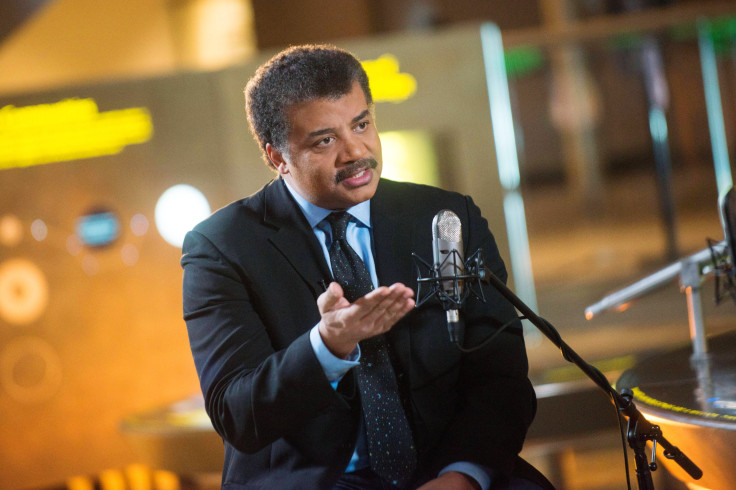Neil DeGrasse Tyson And 'StarTalk' On Television: A Match Made In Space

The late-night show has evolved and grown up over the past decade. With "StarTalk," Neil deGrasse Tyson is bringing the first science talk show to television. It follows the same format as its radio counterpart, so don't expect to see any Johnny Carson-type monologues, bands or guests making their way to a couch next to Tyson. "StarTalk" promises comedy, pop culture, geek obsessions and a learning experience at 11 p.m., once a week on National Geographic Channel.
National Geographic Channel does not expect "StarTalk" to get the same number of viewers as "Late Night with David Letterman" or "The Tonight Show Starring Jimmy Fallon." But that's OK because they are in "#NDT" business. Tyson is unique because he moves the needle in a way that no other astrophysicist can. Tyson has more than 3 million Twitter followers, and the "StarTalk" podcast is downloaded millions of times each month. "Cosmos," with Tyson serving as host, aired on prime-time Sundays on Fox. The show was a huge hit and aired in more than 180 countries. Even his tweets are fodder for national news stories.
With people like Chris Hadfield going viral on YouTube and NASA astronauts Terry Virts and Scott Kelly appearing on "SportsCenter" and the cover of Time, respectively, science has made inroads into the mainstream. Tyson says he's not measuring himself against a standard -- he just wants science out there. "That implies that there is a 'there' that I’m measuring myself to judge whether I’ve arrived," Tyson said in an interview with International Business Times, which he disputes. The point of the show, he said, is to provide a forum for people "who are associated with engineering or science, who are being celebrated in very pop culture settings -- that’s kind of what the recipe is of 'StarTalk.' ”
Joined by comedian co-host Leighann Lord and fellow astrophysicist Charles Liu, in the premiere, Tyson chats with George Takei about "Star Trek," discussing how the series' delivered its science. "It’s recognizing that, for people to embrace it in their hearts and in their day’s priorities -- it needs to come to them in a different kind of package," Tyson said. "Not plunking a textbook in their lap and saying, ‘Here is science, learn it.’ " He went on: "If you’re going to learn science and [are] not otherwise prone to reading textbooks, maybe the way to do it is to reveal the science in things you already care about. Like things that go on in pop culture."
"The definition of pop culture is that many people care about it. ... It shapes decisions that people make in a day," Tyson said. "It can shape politics, it can shape ... how people feel about what’s going on around them. So the more they see that science folds into it, the less intimidated they might feel about science in general. No one has ever accused me of dumbing down science. ... It’s about revealing how ubiquitous science is in our lives and society."
The content of "StarTalk" is admittedly novel: "Because it’s never been done before – it’s the first time science has been in a talk show format on television -- there’s the question of ‘Will it work?’ " Tyson said.
"Cosmos" featured animated segments and other creative elements to create a visually engaging show. "StarTalk" keeps it simple, and the formula works because it creates a sense of intimacy, but Tyson concedes they thought of spicing things up for television. "There was the worry that it would not create a different enough element," Tyson said, "and that maybe we should animate the interviews with the main guests." They actually produced a few animated sketches, he said with an eye toward an explanation of science as "MinutePhysics would."
In the end, he said they went with the talking heads. "We’re just chilling in my office. ... There’s an intimacy you feel unlike a typical talk show with a guest on a couch. ... It’s just the guest and me," Tyson said.
National Geographic has already approved a second season for "StarTalk," but Tyson has not made any decisions on the next set of 10 episodes. Bill Nye will be in Season 1, but speculated, "Can we take any science comedic quips and drop it into that slot, or should it be a man-in-the-street thing where you ask questions," Tyson said.
"StarTalk" Season 1 will include interviews with former President Jimmy Carter, Arianna Huffington, Christopher Nolan, and co-founder of Twitter Biz Stone "You learn about the brain wiring of the person who founded Twitter," said Tyson, promising a different sort of interview.
"We’re driven, really, philosophically here that there are people who don’t yet know they like science. To the extent we can reach those folks, especially the folks that know they don’t know science, we’ll feel accomplished," Tyson said.
© Copyright IBTimes 2024. All rights reserved.






















